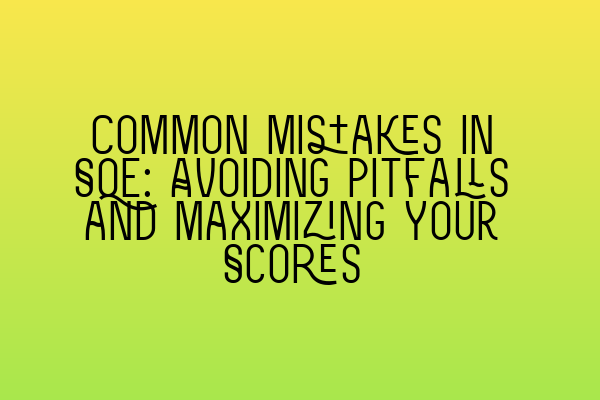Common Mistakes in SQE: Avoiding Pitfalls and Maximizing Your Scores
As aspiring solicitors prepare for the Solicitors Qualifying Examination (SQE), it is essential to be aware of the common mistakes that can potentially hinder their progress and impact their scores. In this blog post, we will explore some of these pitfalls and provide valuable insights on how to avoid them, ensuring you are well-equipped to ace the SQE.
1. Lack of Adequate Preparation
One of the most significant mistakes candidates make is underestimating the amount of preparation required for the SQE. Many may assume that their prior legal education or work experience is sufficient to pass the exam. However, the SQE tests not only legal knowledge but also practical skills. Thus, comprehensive and structured preparation is essential.
To excel in the SQE, build a study schedule that covers all the key areas and topics tested in the exam. Allocate sufficient time for practice questions, mock exams, and revision. Make use of reliable study materials, such as reputable SQE training providers or reliable textbooks. Additionally, consider seeking guidance from experienced mentors or tutors who can provide valuable insights and tips.
Related article:
Joint Ownership: Legal Considerations for Co-Owners of Property
2. Neglecting Legal Research and Writing Skills
The SQE evaluates a candidate’s ability to research and draft legal documents accurately and effectively. Failing to prioritize legal research and writing skills can be a significant downfall. Ensure you are familiar with various legal research resources and techniques, such as online databases, case law, legislation, and legal journals. Practice applying these skills to realistic scenarios, as it will be assessed in the exam.
Additionally, focus on enhancing your legal writing abilities. Take time to understand the structure and formatting of legal documents, such as contracts, pleadings, and letters. Aim for clarity, precision, and conciseness in your writing. Rely on plain English and avoid unnecessary legal jargon that hampers understanding.
Related article:
Commercial Leases: Essential Insights for Business Premises
3. Inadequate Time Management
Time management can make or break your performance in the SQE. The exam is designed to test your ability to work under time pressure, similar to the real-life demands of legal practice. Poor time management can lead to incomplete or rushed answers, resulting in lost marks.
Develop effective time management strategies by practicing under timed conditions. Allocate an appropriate amount of time to each question or task, ensuring you have sufficient time for revision at the end. Learn to prioritize and address the most important aspects of each question, without wasting time on unnecessary details.
4. Overlooking Practical Skills Assessments (PSAs)
PSAs are a vital component of the SQE and often require candidates to demonstrate their competencies in a simulated scenario. Neglecting these assessments can be a grave error. Practice and familiarize yourself with the PSA format, as well as the skills being tested.
For example, in property law, being able to draft a clear and accurate lease agreement or advising clients on joint ownership issues are crucial skills. Ensure you understand the legal principles involved and practice drafting relevant documents or providing concise advice.
Related articles:
Tenant Rights in the UK: Understanding Your Legal Protections
Property Transactions and the Legal Process: A Comprehensive Guide
Mortgages and Land Law: Essential Knowledge for Property Practitioners
5. Failure to Review and Learn from Mistakes
Candidates often overlook the importance of review and reflection. After attempting practice questions or mock exams, it is crucial to analyze your answers and identify areas for improvement. Take note of recurring mistakes, knowledge gaps, or areas where you struggled. Use this feedback to guide your further preparation and target weak areas. Recognizing mistakes and taking steps to rectify them is an essential part of the learning process.
In conclusion, avoiding common mistakes and maximizing your scores in the SQE requires diligent preparation, attention to legal research and writing skills, effective time management, and a thorough understanding of PSAs. By acknowledging these pitfalls and implementing the suggested strategies, you can significantly enhance your chances of success in the SQE. Good luck!

Leave a Reply